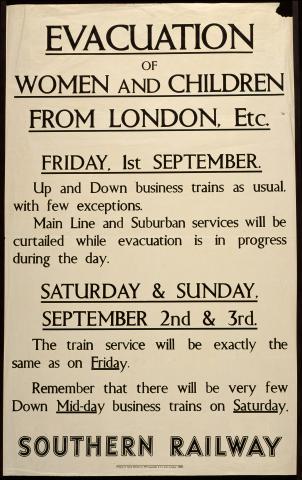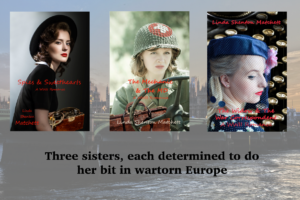
Home Away from Home
By Linda Shenton Matchett
“I didn’t want to go, but my parents made me.” Her voice seasoned with an English accent, the woman shrugged as she spoke. “As an adult, I can understand my mother’s reasoning, but it was a hard time.”
I had just finished giving a presentation about life in America on the World War II home front and asked if anyone had comments or questions. An elderly lady with soft-looking brown hair spoke up from her wheelchair. Her eyes held a distant glaze; memories apparently holding her attention.
She went on to share her experience as one of the more than 800,000 children who were evacuated from London in the early days of World War II. Operation Pied Piper called for the voluntary evacuation of mothers, pregnant women, children, disabled persons, teachers, and other “helpers.” A fear of bombing by the Germans made families readily agree to send their children out of the city to live with strangers.
“Sent to the country, I lived on a farm which was terrifying at first. I had never seen a cow. They were huge. But the people who kept me were lovely and did everything they could to make me comfortable.” Her chin trembled for a moment. “But I missed my family.”
The evacuation began on September 1, 1939 and was a huge process involving thousands of teachers, railway staff, local officials, and volunteers, mostly from the WVS. Children wore a tag tied to our shirt or coat that gave their name, age, and address. They were allowed one suitcase that held items from a list issued by the government: first and foremost, a gas mask, then a change of underclothes, nightclothes, spare socks, toothbrush, comb, towel, soap, handkerchiefs, and a warm coat.
“In spite of being homesick, I was okay, but many children were not. I’ve heard stories. I met other kids after the war.”
Reports from several sources indicate that most evacuees flourished. They and their hosts bonded and developed warm relationships. Unfortunately, many children were miserable. Some of the hosts misinterpreted the children’s upbringing in urban poverty as parental neglect. Other children were used as unpaid labor and treated badly, some hosts going so far as to verbally or physically abuse them. Some number of children struggled to adjust to life in rural areas.
By the end of 1939, the anticipated bombings hadn’t occurred, and more than half of the families brought their children home. Another round of evacuations was offered during the summer of 1940 after the fall of France, and again in 1944 when the V-weapons attacks began, but most families remained intact. For the children who stayed in the country for the duration of the war, VE day took them home to the cities and families, some of whom they barely remembered.
“When I became a parent, I finally understood the excruciating decision my mother and father faced. I was fortunate and found a home away from home, but those were hard times indeed.”

Linda Shenton Matchett writes about ordinary people who did extraordinary things in days gone by. A volunteer docent and archivist for the Wright Museum of WWII, Linda is a former trustee for her local public library. She is a native of Baltimore, Maryland and was born a stone’s throw from Fort McHenry. Linda has lived in historic places all her life, and is now located in central New Hampshire where her favorite activities include exploring historic sites and immersing herself in the imaginary worlds created by other authors. Learn more about Linda and her books at http://www.LindaShentonMatchett.com.


10 thoughts on “Operation Pied Piper”
So not every child got to explore beyond the land of “spare oom.”
Fascinating!
Thanks for visiting. I’m glad you enjoyed the post.
Thanks for hosting me, Sherry!
Linda, thank you for sharing this story. It’s hard to imagine how difficult it must have been on the children to have to leave their families and everything they’d known behind to go live with strangers. (I hope they had room in their one suitcase for something familiar like a teddy bear, etc.) It would have been so terribly difficult for the parents, as well, but they were putting their child’s safety above their own needs.
Wow, the more I learn about things that went on during WWII, I am stunned!! Thank God for His hand of protection! This is a wonderful reminder of how hard those times were and the sacrifices so many made. We have it so good and yet we whine all the time – shame on us!! Thank you for sharing this story!!! 🙂
I’m glad you enjoyed the post. Definitely a reminder of all we have that is good.
It’s shocking how much the war affected ordinary families, even those far away from the frontlines. Families in Ukraine probably understand all too well. My prayers are with them.
I always think of Narnia, too, when I hear about kids being sent to the country. Lovely story.:)
Yes, I think of that too:) I’m glad you enjoyed the story.
Thank you for visiting. I forgot that was part of the Narnia stories.
Comments are closed.